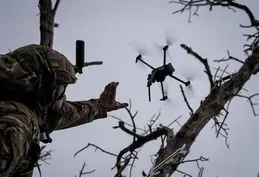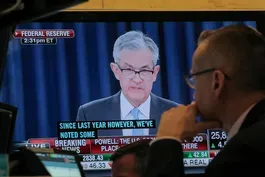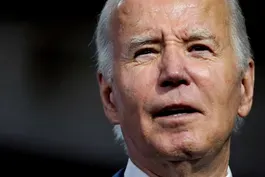
COP28 nations agree to transition from fossil fuels
Clip: 12/13/2023 | 6m 27sVideo has Closed Captions
Nations at COP28 agree to transition away from fossil fuels, but loopholes remain
The COP28 climate conference closed with more than 200 nations agreeing they should transition away from the fossil fuels that are warming the planet. They also pledged to triple the amount of renewable energy deployed by 2030 and curb the release of methane. But reaction to the agreement has been mixed. William Brangham discussed that with Manish Bapna of the Natural Resources Defense Council.
Problems with Closed Captions? Closed Captioning Feedback
Problems with Closed Captions? Closed Captioning Feedback
Major corporate funding for the PBS News Hour is provided by BDO, BNSF, Consumer Cellular, American Cruise Lines, and Raymond James. Funding for the PBS NewsHour Weekend is provided by...

COP28 nations agree to transition from fossil fuels
Clip: 12/13/2023 | 6m 27sVideo has Closed Captions
The COP28 climate conference closed with more than 200 nations agreeing they should transition away from the fossil fuels that are warming the planet. They also pledged to triple the amount of renewable energy deployed by 2030 and curb the release of methane. But reaction to the agreement has been mixed. William Brangham discussed that with Manish Bapna of the Natural Resources Defense Council.
Problems with Closed Captions? Closed Captioning Feedback
How to Watch PBS News Hour
PBS News Hour is available to stream on pbs.org and the free PBS App, available on iPhone, Apple TV, Android TV, Android smartphones, Amazon Fire TV, Amazon Fire Tablet, Roku, Samsung Smart TV, and Vizio.
Providing Support for PBS.org
Learn Moreabout PBS online sponsorshipCOP 28, has come to a close with nearly# 200 na that they should transition away from burning# the fossil fuels that are warming the planet.
In addition to that promise, the nations# pledged to triple the amount of wind,## solar and other renewable energy deployed by# 2030 to stop deforestation by the same year## and to curb the release of methane, which# is one of the most potent greenhouse gases.
The reaction to the agreement has# been mixed.
While some hailed this## first ever mention of fossil fuels,# others, especially those who represent## small island nations threatened by sea# level rise, were much more critical.
Here's Anne Rasmussen from the nation of Samoa.
ANNE RASMUSSEN, Alliance of Small Island# States: We have come to that the course correction# that is secured.
We have made an incremental# advancement over busin when what we really needed is an exponential# step change in our actions and support.
WILLIAM BRANGHAM: Joining me now# is Manish Bapna.
He is president## and CEO of the Natural Resources Defense Council.
Manish, welcome back to the "NewsHour."
A lot of concern going into this COP.# We have just lived throu the hottest year in recorded human# history.
And people were arguing,## why are you holding a climate summit in a nation# that is known for pumping out oil and gas?
But, still, some historic first, as I mentioned.# What do you make of this whole agreement?
MANISH BAPNA, President and CEO, Natural# Resources Defense Council: I mean, I think## both of these poin There was -- for the first time 19 5 countries, to explicitly call for the# transition away, out of fossil fuels.
That is a## significant signal to policymakers, to investors,# to CEOs about what the future actually looks like.
But equally true, the science is clear, the# math is unforgiving, and we need to see a## lot more speed, a lot more scale.
The concern# that the Samoan delegate mentioned is real.
WILLIAM BRANGHAM: I mean, I hear what you're# saying about fossil fuels, but it is remarkable## that, 30 years into these summits, we're# finally now getting around to mentioning this.
I mean, it's like having back in the# '60s conferences about lung cancer and## taking 30 years to talk about weaning ourself off# cigarettes.
I mean, it's progress, but baby steps.
MANISH BAPNA: You're right.
But the worldwide.
This is a significant industry# that has a vested interest in status quo.## And to get all 195 countries to sign a# piece of paper, a statement of purpose,## that it is time now to transition away from# fossils is not a small, insignificant step.
But what we need to do is actually# translate that ambition into action.
WILLIAM BRANGHAM: One of the other big# pledges was this ramp-up of renewables.
And, as you well know, there is a Green# Revolution that is under way.
Do you think## we will be able to deploy wind and solar# and geothermal and hydrogen and battery## storage in the full force needed to keep# us from dangerously warming this planet?
MANISH BAPNA: That is in my mind what# is kind of most encouraging about this## conference and about where we are today,# is, we're beginning to see the early signs## of a better future, a more inclusive, a# more productive, a more resilient future.
Look at just what's happened in the United States# in the last 18 months after the passage of the## Inflation Reduction Act.
We have seen over $100# billion of announcements of investments in solar,## in wind, in electric vehicles.
We have# seen over 100,000 new jobs created.
We're beginning to see shovels on# the ground.
We're starting to see## the proof points of real things being# built, a better future.
And I think## that shift is going to happen in a more# quicker pace than many of us realize.
WILLIAM BRANGHAM: One of the other# big developments was around this issue## known as loss and damage, which is a fund# being established to help the world deal with the real-world impacts# they're having from climate change today.
Do you think that the developed# world is really finally starting## to reckon with the damage that our# pollution is doing to those nations?
MANISH BAPNA: It's starting to.
This is symbolically a big deal the most vulnerable countries that contributed the# least to the climate crisis cope with the impacts.
But what we need to see is a lot more money go# into that fund and a lot more money more generally## go from the rich world to the developing# world to help with the energy transition,## to build resilience.
This is not an act# of charity.
This is an act of justice.
WILLIAM BRANGHAM: One of the knocks on these COP# summits is that there is no enforcement mechanism,## that a nation can say, I pledge to# cut emissions by X gigatons by Y date,## and if they fail to do that there's no way# of saying -- of holding them to account.
Do you think we put too much# emphasis on these global summits?
MANISH BAPNA: I think we have to be clear-eyed## about what the summi It is a statement of purpose.# It is a vision for the future,## but it is up to us then to be able to translate# that and hold governments accountable.
So, now just take the United States, signed up# to a language about transitioning away from## fossil fuels.
Yet the largest oil and gas# producer in the world is the United States.
And if you look at the next 10 years,# the greatest increase we will see is## in the United States.
So how do we# actually reconcile that?
How do we## use that commitment internationally to# push for greater ambition domestically## to transition from fossils to clean?# That's the work that we need to do.
WILLIAM BRANGHAM: Manish Bapna, president and# CEO of the NRDC, great to see you.
Thank you.
MANISH BAPNA: Thank you.
Thank you very much.
Drone warfare transforms battle between Ukraine and Russia
Video has Closed Captions
How drone warfare has transformed the battle between Ukraine and Russia (7m 51s)
Federal Reserve suggests it may cut interest rates in 2024
Video has Closed Captions
Interest rates remain unchanged, but Federal Reserve signals cuts coming in 2024 (5m 32s)
Impeachment expert breaks down House GOP inquiry into Biden
Video has Closed Captions
Impeachment expert Michael Gerhardt breaks down House GOP inquiry into Biden (10m 53s)
Israeli troops meet renewed resistance from Hamas in Gaza
Video has Closed Captions
Israel meets renewed resistance from Hamas amid pressure to reduce civilian casualties (9m 50s)
The self-driving safety concerns that led to Tesla recall
Video has Closed Captions
The self-driving safety concerns that led to Tesla's recall of 2 million cars (5m 21s)
Providing Support for PBS.org
Learn Moreabout PBS online sponsorshipMajor corporate funding for the PBS News Hour is provided by BDO, BNSF, Consumer Cellular, American Cruise Lines, and Raymond James. Funding for the PBS NewsHour Weekend is provided by...
















